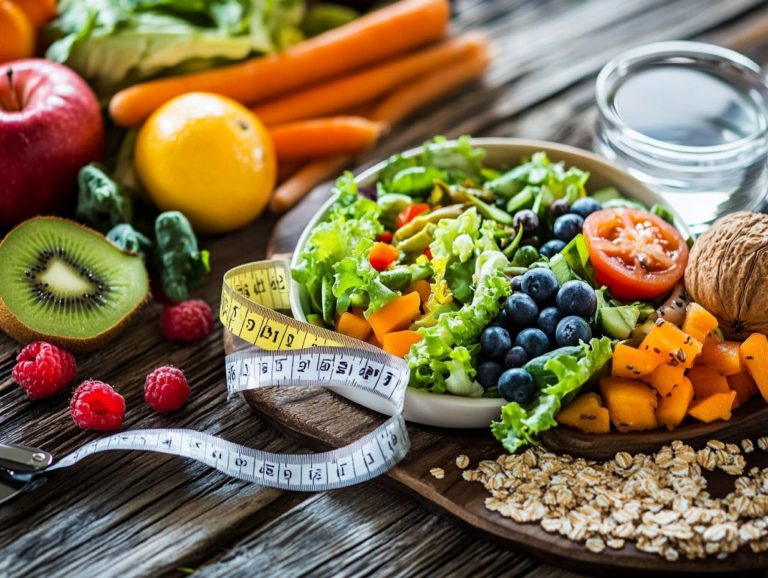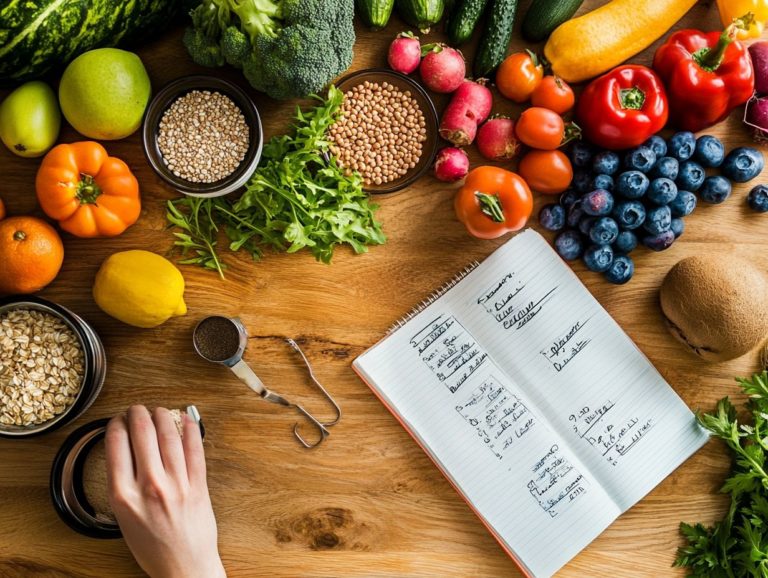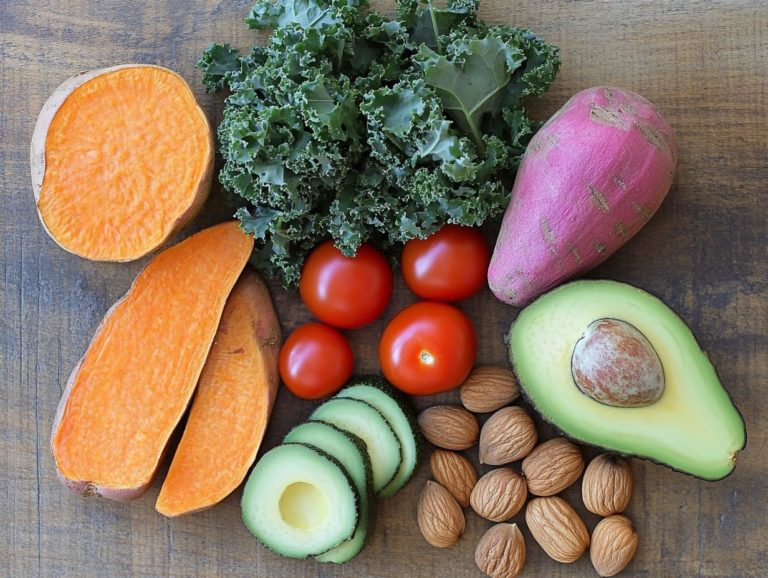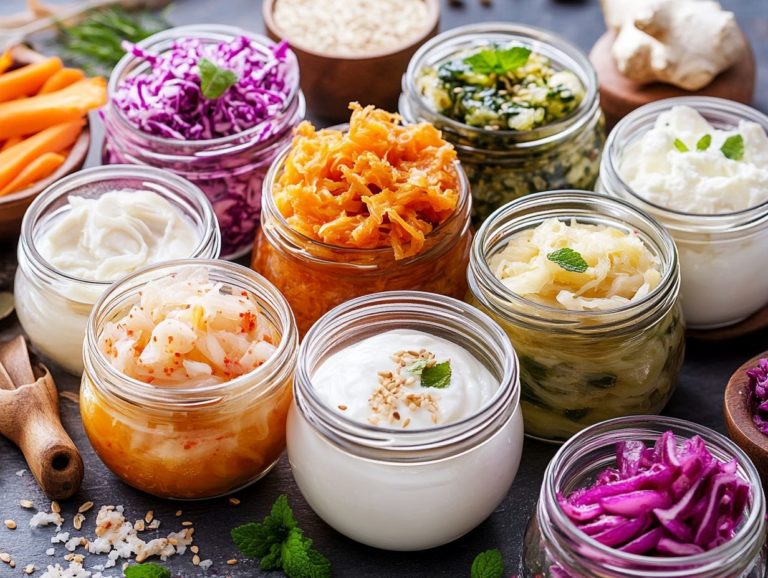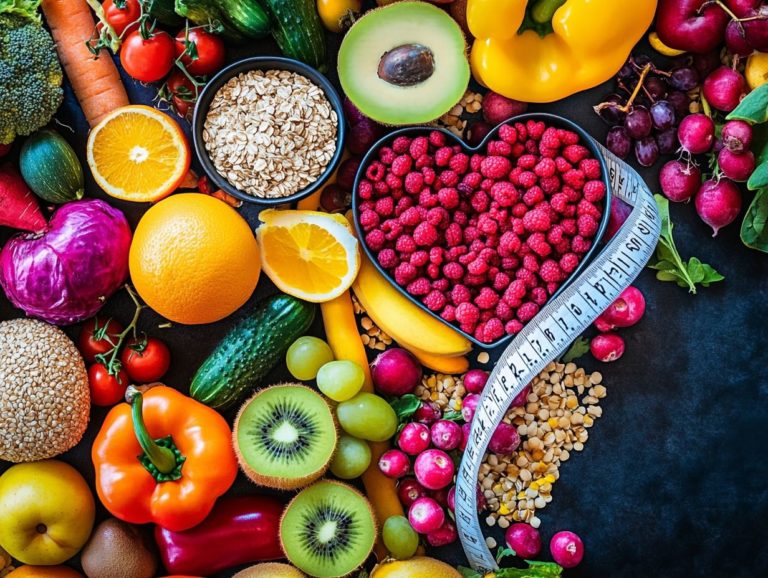The Role of Protein in Healthy Eating
Protein is an essential macronutrient that plays a pivotal role in your overall health and well-being. From building and repairing tissues to serving as a source of energy, a deeper understanding of protein can elevate your dietary choices.
This article delves into the various types of protein both animal and plant-based examines your daily protein needs, and highlights its connection to effective weight management. You ll also find valuable tips for seamlessly incorporating protein-rich foods into your meals.
Discover the amazing benefits of protein and transform your health today!
Contents
- Key Takeaways:
- Understanding Protein and Its Importance
- Types of Protein and Their Benefits
- How Much Protein Do You Need?
- Protein and Weight Loss
- Incorporating Protein into Your Diet
- Frequently Asked Questions
- What is the role of protein in healthy eating?
- How much protein should I be consuming in a healthy diet?
- What are some good sources of protein in a healthy diet?
- Can protein help with weight loss?
- What happens if I don’t consume enough protein in my diet?
- Can I consume too much protein in a healthy diet?
Key Takeaways:
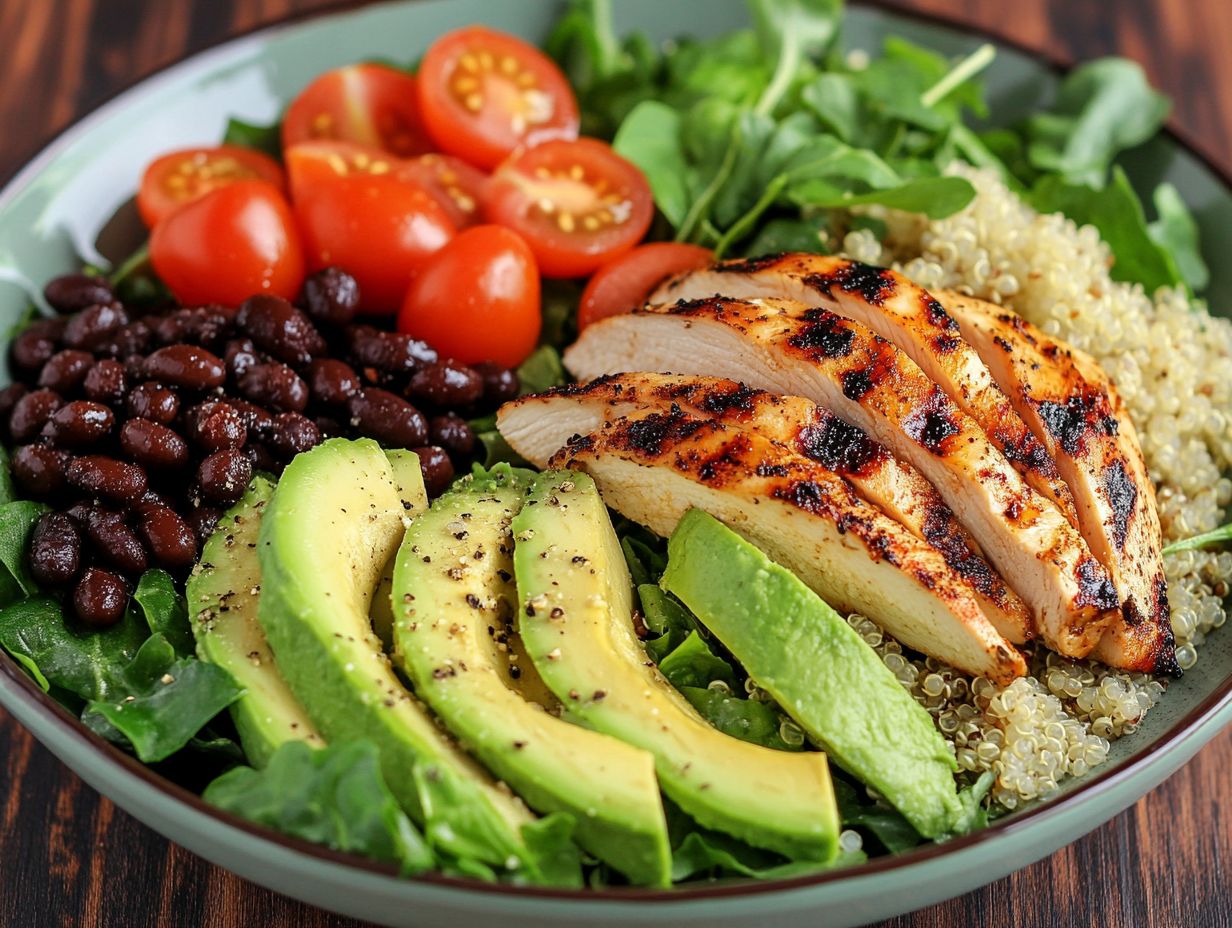
Protein is a crucial macronutrient that plays a key role in the body’s functions and should be included in a healthy diet. Animal and plant-based proteins offer different benefits, so it’s important to include a variety in your diet. The recommended daily intake of protein varies based on age, gender, and activity level. Consult with a healthcare professional to determine your specific needs.
Understanding Protein and Its Importance
Proteins are vital macronutrients that serve as the building blocks for tissues and cells. They are key players in muscle growth, immune function, and overall health.
Composed of amino acids both essential and nonessential proteins sustain life and support how our bodies work, especially for adults following dietary guidelines for optimal protein intake.
By grasping the significance of protein, you enable yourself to make informed dietary choices and incorporate protein-rich foods into your meals.
What is Protein and Why is it Essential?
Protein is an essential nutrient made up of long chains of amino acids that are crucial for many bodily functions, including muscle synthesis, hormone production, and enzymatic activity.
Proteins can be categorized into complete and incomplete types based on their amino acid profiles. Complete proteins contain all the essential amino acids your body requires, while incomplete proteins may fall short in one or more areas. Understanding protein nutrition is vital for effective dietary planning.
To gain health benefits from protein, include a variety of sources in your meals. Complete proteins, often found in animal products like meat, dairy, and eggs, deliver a balanced amino acid profile essential for muscle repair and overall cellular function.
Meanwhile, plant sources such as legumes and grains might be incomplete but can be cleverly combined to create complete protein profiles. This understanding is especially significant, as protein plays a key role in maintaining a robust immune system, supporting metabolic processes, and facilitating recovery after exercise.
Thus, ensuring an adequate intake tailored to your individual needs is fundamental for achieving optimal health.
Types of Protein and Their Benefits
There are two main categories of protein sources: animal and plant, each presenting distinct advantages and varying protein content that are vital for a balanced diet.
Animal sources like red meat, poultry, and dairy are renowned for delivering complete proteins loaded with essential amino acids. On the other hand, plant sources like legumes, quinoa, and tofu serve as nutrient-rich alternatives that can seamlessly fit into a protein-focused diet.
By understanding the nuances between these protein types, you can make informed choices about your protein intake, tailoring it to best suit your dietary needs.
Start planning your protein-rich meals today for a healthier tomorrow!
Animal vs Plant Protein
The debate between animal and plant protein sources is important, as each offers distinct nutritional benefits and has unique implications for your health, especially concerning protein content and amino acid profiles.
Animal sources, such as chicken, fish, and dairy, typically provide complete proteins that contain all essential amino acids. On the other hand, plant sources like legumes and nuts may require some thoughtful pairing to ensure a balanced intake.
Animal proteins are generally more digestible and can facilitate quicker muscle recovery after exercise, but they often contain higher saturated fat content and various environmental considerations.
In contrast, plant proteins are rich in dietary fiber, vitamins, and minerals, often making them a more sustainable choice, although they can fall short in certain amino acids.
Try mixing different protein types in your meals. For example, pair lentils with rice or enjoy yogurt topped with nuts to enrich your diet and help ensure that you meet your protein requirements from a diverse array of sources.
Complete vs Incomplete Proteins
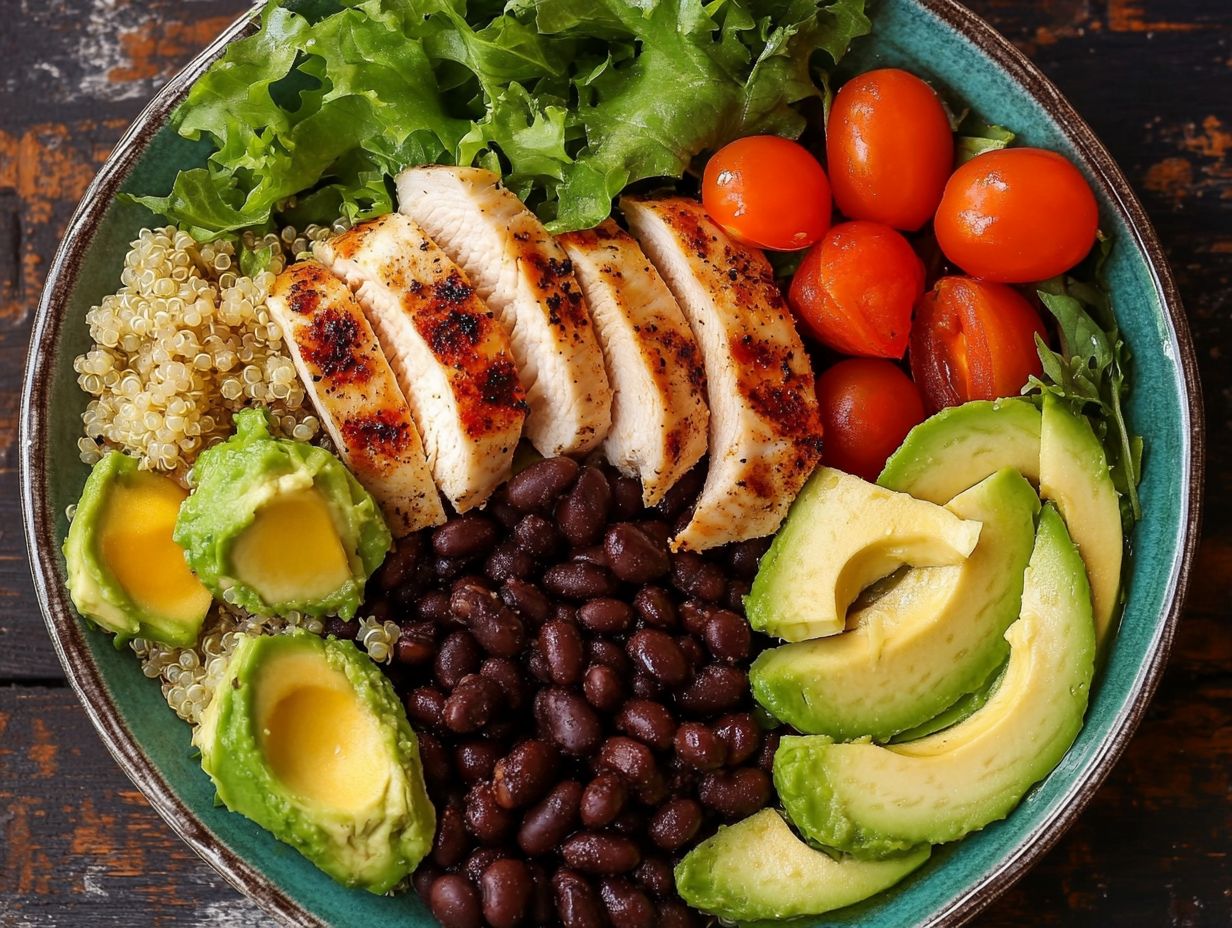
Complete proteins and incomplete proteins present distinct differences in their amino acid profiles. This can significantly influence your dietary choices and your body’s capacity to synthesize new proteins.
Complete proteins, typically found in animal sources such as beef, eggs, and dairy, comprise all nine essential amino acids. In contrast, incomplete proteins, often sourced from plants, may be missing one or more of these vital building blocks.
Grasping this distinction is essential for effective meal planning, particularly if you’re following a vegetarian or vegan diet. By creatively combining various protein sources, you can ensure that you obtain a well-rounded array of amino acids.
For instance, pairing rice with beans not only elevates the flavor but also delivers a complete set of essential amino acids. Incorporating nuts, seeds, and legumes into your salads or smoothies can further diversify your protein intake.
Rotating between soy products, quinoa, and dairy can assist you in maintaining a balanced diet. This makes it easier to meet your daily protein requirements while relishing a variety of delicious foods.
How Much Protein Do You Need?
Figuring out how much protein you need is key to feeling your best and hitting your fitness goals! It varies depending on factors like your age, activity level, and overall dietary requirements.
For healthy adults, the general recommendation is about 0.8 grams of protein per kilogram of body weight. However, if you re regularly active or focused on building muscle, that amount may need to increase to support your goals effectively.
Recommended Daily Intake
The recommended daily intake of protein varies based on factors like age, sex, and physical activity. The USDA suggests a baseline of 46 grams for adult women and 56 grams for adult men.
Understanding these protein recommendations is essential for ensuring you meet your dietary needs and support your overall health, especially if you’re regularly exercising or focusing on muscle-building activities.
Take the time to evaluate your unique circumstances, including your lifestyle choices and fitness goals, to accurately assess your protein needs. For instance, if you re an athlete, you may require significantly more protein to aid muscle recovery and growth.
Tracking your daily protein is a game-changer! Food diaries or mobile apps can help you easily monitor your intake and stay on track.
Adjusting your dietary habits may involve incorporating more protein-rich foods like:
- Lean meats
- Legumes
- Dairy products
You might also want to explore protein supplements when necessary to meet your personal goals effectively.
Protein and Weight Loss
The relationship between protein intake and weight loss is crucial. By incorporating protein-rich foods into your healthy diet, you can effectively aid in weight management and enhance feelings of fullness.
Increased protein consumption is linked to improved muscle growth and retention, both of which are vital during weight loss. It also boosts your metabolism, supporting your overall health and making your weight loss journey more sustainable and effective.
The Link Between Protein and Weight Management
The connection between protein and weight management is backed by research highlighting protein’s ability to foster feelings of fullness and regulate appetite. This makes it essential for effective weight loss strategies.
Incorporating adequate amounts of protein-rich foods into your diet helps you manage daily calorie intake and enhances your overall health.
When protein is consumed, it triggers the production of hormones like glucagon and peptide YY, crucial for signaling satiety to the brain. A higher protein intake can also boost your metabolic rate by increasing energy expenditure during digestion and absorption.
To make the most of these benefits, enrich your meals with foods such as:
- Lean meats
- Legumes
- Dairy
- Nuts
Including protein in your snacks like Greek yogurt or a handful of almonds not only curbs hunger but also supports sustained energy levels, facilitating better weight control.
Incorporating Protein into Your Diet
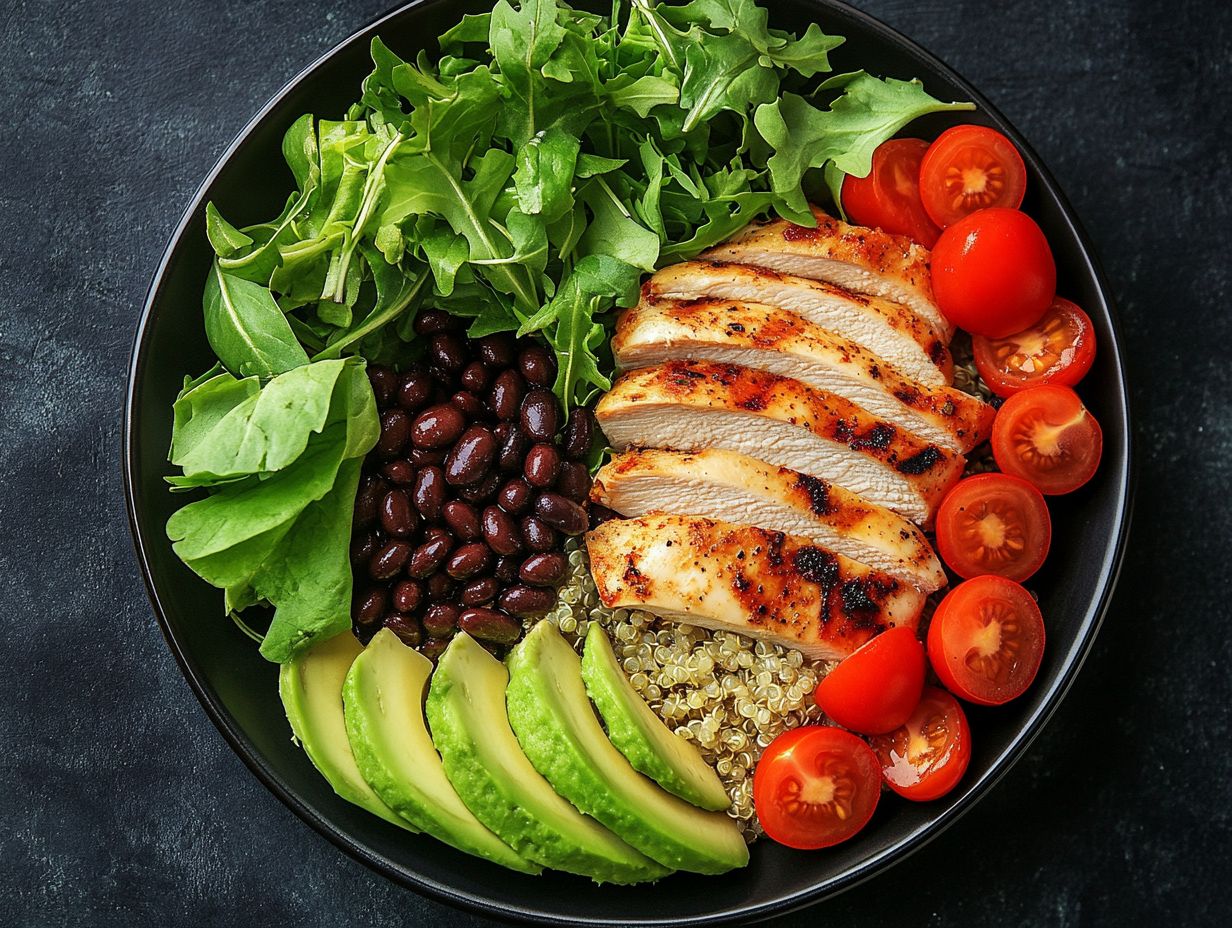
Incorporating protein into your diet is easy when you embrace various healthy protein sources. This approach ensures a balanced intake of essential amino acids and allows for an array of delicious foods.
Meet your protein needs by including both animal sources like lean meats and fish, and plant-based options such as legumes, nuts, and seeds to complement your dietary regimen.
Healthy Sources of Protein
Healthy sources of protein are vital for a balanced diet and can be found in both animal and plant categories, offering choices tailored to your preferences and dietary needs.
Animal options like chicken, fish, and dairy provide complete proteins, while plant-based sources such as beans, lentils, and quinoa offer excellent alternatives to enrich your nutrient profile. Incorporating a variety of these sources can elevate your overall health and energy levels.
Grilled salmon, for example, not only provides heart-healthy omega-3 fatty acids but also transforms a meal into a delightful culinary experience. On the plant side, blending chickpeas into hummus or tossing them into salads boosts flavor and fiber content.
Greek yogurt is a versatile ally, perfect for smoothies or as a topping for fruits. Marinated tofu can be stir-fried to create a satisfying dish for those following vegetarian or vegan lifestyles.
By creatively integrating these protein-rich foods into your daily routine, you can effortlessly meet your nutritional goals.
Meal Ideas and Recipes
Creating meal ideas that incorporate protein-rich foods is essential for reaching your dietary goals while enjoying a delightful culinary experience. Start your day with a bowl of Greek yogurt topped with vibrant fruits and crunchy nuts, or relish a colorful lunch salad topped with juicy grilled chicken or fluffy quinoa.
You can explore countless ways to enjoy healthy protein sources every day!
Take your meals to the next level by experimenting with various preparation techniques and flavor combinations. Poach eggs for a creamy breakfast or roast chickpeas for a satisfying crunch in your salad.
For dinner, envision baked salmon served alongside a flavorful lentil dish infused with spices like cumin and coriander, creating a harmonious layer of flavors.
By incorporating diverse ingredients, you enhance taste and elevate the nutritional value of each meal, ensuring every bite is enjoyable and healthful.
Frequently Asked Questions
What is the role of protein in healthy eating?
Protein is an essential type of nutrient that provides energy and plays important roles in the body, such as building and repairing tissues, maintaining muscle mass, and supporting the immune system.
Start integrating protein into your diet today for improved health and well-being!
How much protein should I be consuming in a healthy diet?
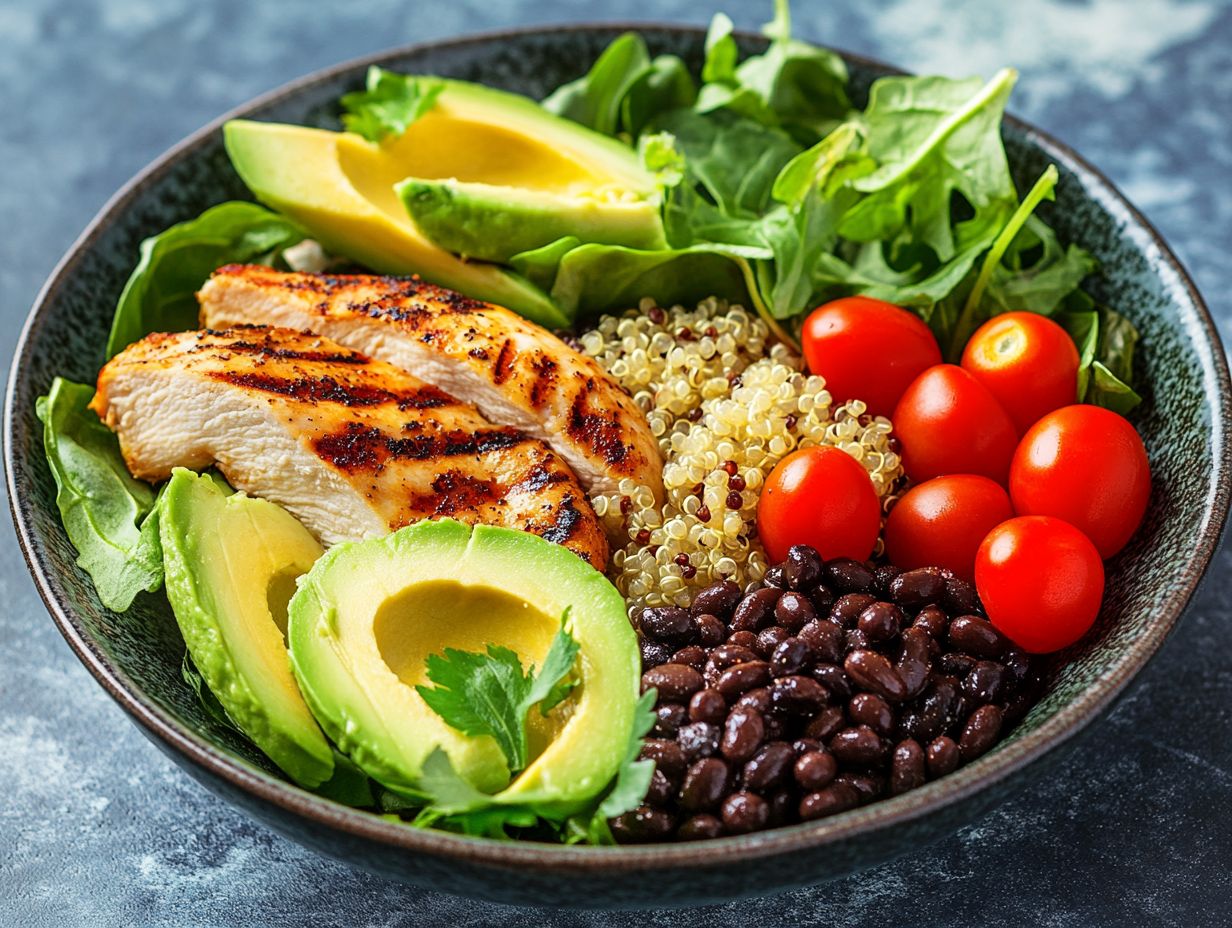
The daily protein intake depends on your age, gender, and activity level. On average, aim for 0.8 grams of protein per kilogram of your body weight, which is about 10-35% of your daily calories.
What are some good sources of protein in a healthy diet?
Great sources of protein include lean meats, poultry, fish, eggs, dairy, legumes, nuts, and seeds. Try to mix them up for a complete range of amino acids, which are the building blocks of protein.
Can protein help with weight loss?
Yes, protein helps you feel full and satisfied longer, which can prevent overeating. It also takes more energy to digest, boosting your metabolism and helping burn more calories.
What happens if I don’t consume enough protein in my diet?
Not getting enough protein may lead to muscle loss, weakness, fatigue, and a weakened immune system. It’s crucial to ensure you get enough protein for your overall health.
Can I consume too much protein in a healthy diet?
Too much protein can harm your body, stressing your kidneys and raising heart disease risks. Stick to the recommended daily intake and choose lean protein sources.

